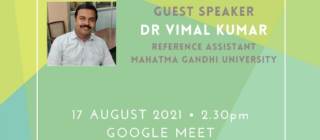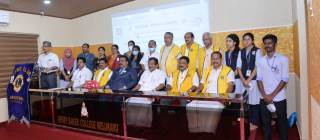Theory and Practice of Oral History
Certificate courses are designed to bridge the gap between different phases of academic study, or to provide additional professional training and qualifications. The courses provide students an added dimension to their undergraduate and postgraduate degree by exposing them to professional settings. The purpose of the certificate course is to provide students with theoretical knowledge and practical knowledge in specific areas. Upon completion, students will get benefit out of a certificate course that will accompany their degree and illustrate their added knowledge, skills, and experience to potential employers and institutions.
Programme Structure
Certificate programme in History is designed with 30 instructional hours. It includes Lecture hours and practical hours. On completion certificates are issued by college or outside agencies in collaboration with college.
Programme Attributes
- Will gain additional skill in a particular area.
- Will equip the student with an additional qualification.
- Will enhance demand in the job market.
OBJECTIVES
- To make aware of the significance of Oral History
- To learn basics of Oral history
- Expertise in the collection and documentation of Oral history
- To create a passion in the everyday life of common people
- To develop interpersonal interactive skills.
- To learn interview methods.
COURSE OUTCOME
- Collection and preservation of vast mass of unwritten sources of history.
- Gives life to untold and unrecorded histories.
- Supplements written histories.
- Gives voice to voiceless.
MODULE -1 : (5hrs.)
Understanding Oral History
- Introduction to Oral History
- What is Oral History?
- Scope and Significance of Oral History
- Dimensions of Oral history
- The distinction between Oral history and Oral tradition
MODULE-2: (5hrs.)
Development Of Oral History
- Early History
- Evolution and trends
- Growth and development
- Allen Nevis
- Paul Thompson
MODULE-3 : (4hrs)
Principles Of Oral History Research
- Project Designing
- Area of focus
- Selection of the topic
- Selection of Narrators General Principles
- Best Practices
- Pre-Interview
- Interview
- Post –Interview
MODULE-4: (6hrs)
Oral History Methodology
- Preparing for Interview
- Types of interviews
- Preparation of questioners
- Interview Process
- Equipment’s for interview
- Tips for interview
- From recording to page
- Oral history archive
MODULE-5: (10hrs)
Oral History Archiving
- Project work
- Classroom Projects
- Oral History collection and Documentation
Reference
- Lynn Abrams, Oral History Theory, (Routledge, 2010).
- Valerie Raleigh Yow, Recording Oral History: A Practical Guide for the Humanities and Social Scientists (Alta Mira Press, 2005).
- Ritchie, Donald A., ed. The Oxford Handbook of Oral History. Oxford University Press, 2011
- Donald A. Ritchie, Doing Oral History, (Oxford University Press, 2003).
- Paul Thompson, The Voice of the Past (Oxford University Press, 2000, 3rd edition).
- Linda P. Wood, Oral History Projects in Your Classroom (Oral History Association Pamphlet Series,2001).
- Robert Perks & Alastair Thomson, The Oral History Reader (Routledge, 1998).



